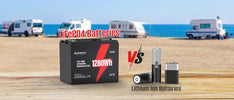
LiFePO4 vs Lithium-Ion Batteries: Which One is Better?
, 4 min reading time


, 4 min reading time
In our modern life, external power systems keep us connected with the relative comfort of modern technology. Everything from your phone to even your energy system utilizes a form of battery to keep itself running, and lithium batteries, specifically LiFePO4 and lithium-ion, are the most popular to use.
Over the years, battery technology has rapidly advanced to the point that even more superior technology can be created. The price of lithium batteries has also drastically reduced, making them much more affordable than they have ever been, but which type of lithium battery is right for you?
Lithium-ion batteries are one, if not the most popular, rechargeable battery on the market. If you have a smartphone, watch, or rechargeable gaming system, they most likely use a lithium-ion battery. All lithium-ion batteries are built with three essential components: the cathode, the anode, and an electrolyte. These batteries are built using either single or multiple lithium-ion cells and then installed inside a device with a protective circuit board.
Lithium-ion batteries are mainly used in consumer electronics for two big reasons: their high-energy density and their fast charging capabilities. When space and weight need to be taken into extreme consideration, then lithium-ion batteries are the correct choice.
For example, a smartphone wouldn’t be as useful or popular if it weighed an extra 20 pounds due to the battery. However, not every application can benefit from the lithium-ion battery, which is where the LiFePO4 batteries come in.
A LiFePO4 battery is a type of lithium battery that’s constructed from lithium iron phosphate; the name comes from the chemical formula of the constructed elements, lithium (Li), iron (Fe), and phosphate, which is made up of one part phosphorus and four parts oxygen (PO4).
A big reason for their integration in solar systems is because of their long lifespans, four times that of lithium-ion batteries. That coupled with both the ability to reach between 3000-5000 cycles and the ability to get a 100% depth of discharge, makes them very attractive to systems that need to be constantly running.
While both LiFePO4 batteries and lithium-ion batteries have some similarities, especially considering that both use lithium, there are a few distinct differences between the two that make each more beneficial for certain applications.
To put it bluntly, LiFePO4 batteries are considered the safest of the two batteries for a variety of reasons. The main one is that LiFePO4 batteries, due to their chemical composition, are less prone to overheating or catching fire. This isn’t to say that lithium-ion batteries aren’t safe; on the contrary, lithium batteries are often regarded as the safer type of battery compared to others, such as lead acid batteries.
When handled correctly, lithium-ion batteries are as safe as they come, but they have been known to overheat and even catch on fire if they’re damaged or improperly handled. Not so much with the LiFePO4 batteries, which can come equipped with overheating protection.
When referring to the energy density of batteries, that means it describes how much energy can be stored in that battery based on weight or volume. As explained previously, lithium-ion batteries have a higher energy density compared to LiFePO4 batteries. This means that when you have a LiFePO4 battery and a lithium-ion battery of the same weight or volume, the lithium-ion battery can “hold” more energy, which is why they’re very popular for many consumer electronics.
LiFePO4 batteries typically have a longer battery life and cycle life than lithium-ion batteries. What this means is that not only do LiFePO4 batteries last longer but they can be charged and discharged more often than their counterparts. Another way of putting it is that they can be charged and drained much more frequently than lithium-ion batteries, lasting several thousand more cycles.
At the end of the day, whether you go with lithium-ion or LiFePO4 batteries will entirely depend on your needs. However, there is without doubt that the LiFePO4 batteries are more favored due to their relative safety, lifecycle, and included features such as overcharge and overheating protections. Sunrich Energy’s LiFePO4 batteries can handle many applications, including solar, off-grid, marine, and much more.



